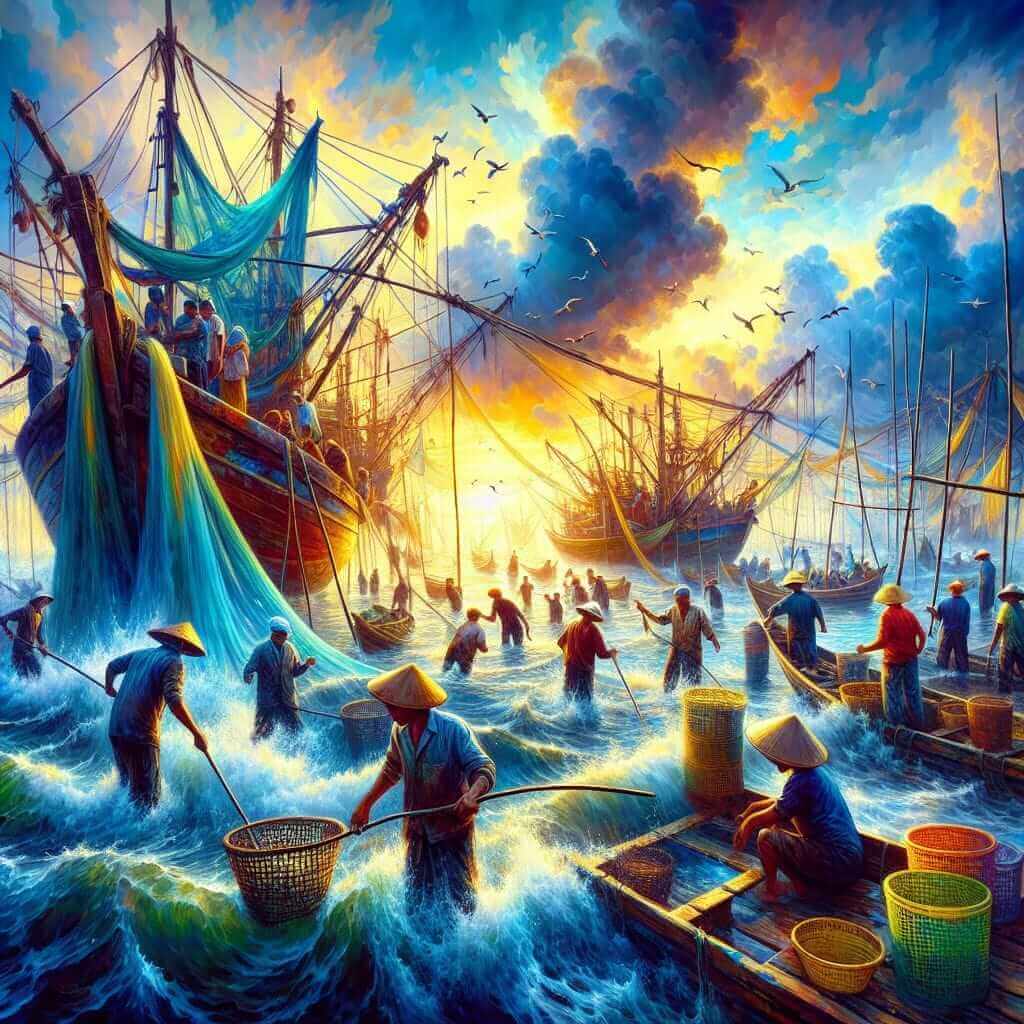The Reading section of the IELTS exam tests a candidate’s ability to understand and interpret academic texts. With topics ranging from scientific research to historical narratives, the IELTS Reading test can include a variety of subjects. One such topic that has garnered attention lately is climate change and its implications, reflecting its relevance in today’s world.
Given its prominence and recurring presence in IELTS Reading passages, an understanding of how climate change impacts various sectors is crucial. This article will provide practice materials tailored to an IELTS Reading passage on “What are the implications of climate change on fisheries management?”. The insights provided aim to help you hone your reading skills for a potential future topic in your exam.
Practice Reading Passage: Medium Text
The Impact of Climate Change on Fisheries Management
Climate change has emerged as a critical challenge for global fisheries. The rise in global temperatures, coupled with acidification of the oceans, is having far-reaching effects on marine ecosystems. These changes are affecting fish distribution, abundance, and the health of marine biodiversity, in turn complicating efforts to manage fisheries sustainably.
Changes in Fish Distribution
One of the most noticeable impacts of climate change is the alteration in fish distribution. As ocean temperatures rise, many fish species are migrating towards cooler waters. This northward and deeper migration has significant implications for fisheries management as traditional fishing grounds become less productive.
Impact on Fish Reproduction
The acidification of oceans due to increased CO2 levels impacts the ability of many marine organisms to reproduce. Species such as shellfish, which rely on calcium carbonate to form their shells, are particularly vulnerable. This reproductive challenge further affects the supply chain of fisheries, leading to potential economic losses.
Ecosystem Imbalance
Climate change has also led to the imbalance of marine ecosystems. Critical habitats like coral reefs are deteriorating due to temperature rise and ocean acidification, affecting species that depend on these environments for spawning and shelter. An imbalance in the ecosystem can reduce the resilience of marine biodiversity, making fisheries management more complex.

Adaptation Strategies
To cope with these changes, fisheries management must incorporate adaptive strategies. These include shifting quotas in response to changing fish distributions, establishing marine protected areas to conserve critical habitats, and investing in research to better understand climate impacts on marine life. Effective adaptation requires a combination of scientific research, policy adjustments, and stakeholder collaboration.
Questions
Multiple Choice
-
What is one of the primary effects of climate change on fish species mentioned in the text?
- A. Increased reproduction rates
- B. Migration towards cooler waters
- C. Development of stronger shells
- D. Increased economic stability
-
Which marine organisms are affected most by ocean acidification according to the passage?
- A. Fish
- B. Shellfish
- C. Coral reefs
- D. Marine mammals
True/False/Not Given
-
Fisheries management faces no difficulties due to climate change.
- True
- False
- Not Given
-
Marine ecosystems can become more resilient due to the changes brought by climate change.
- True
- False
- Not Given
Matching Information
-
Match the following issues with their descriptions:
- A. Changes in Fish Distribution
- B. Impact on Fish Reproduction
- C. Ecosystem Imbalance
i. Difficulty in forming shells
ii. Migration to cooler areas
iii. Deterioration of coral reefs
Sentence Completion
- Traditional fishing grounds are becoming less productive because ____.
Summary Completion
- Climate change leads to the ____ of fisheries, necessitating new ____ strategies.
Answer Keys
Multiple Choice
- B. Migration towards cooler waters
- B. Shellfish
True/False/Not Given
- False
- False
Matching Information
-
- A] ii. Migration to cooler areas
- B] i. Difficulty in forming shells
- C] iii. Deterioration of coral reefs
Sentence Completion
- Traditional fishing grounds are becoming less productive because fish species are migrating towards cooler waters.
Summary Completion
- Climate change leads to the alteration of fisheries, necessitating new adaptive strategies.
Lessons Learned
When dealing with reading passages such as this:
- Identify Key Information: Picking out the main impacts like fish distribution changes or reproductive difficulties helps understand the passage’s focus.
- Contextual Understanding: Knowing why certain points are discussed aids in tackling questions related to the text’s specifics.
- Practice Makes Perfect: Regularly practicing with such passages can improve speed and accuracy in identifying relevant information.
Vocabulary
- Abundance (noun): /əˈbʌndəns/ — a large quantity of something.
- Resilience (noun): /rɪˈzɪliəns/ — the ability to recover quickly from difficulties.
- Adaptation (noun): /ˌædəpˈteɪʃn/ — the process of changing to fit new conditions.
Grammar Focus: Complex Sentences
- Complex Sentences: These consist of an independent clause and at least one dependent clause, connected by subordinating conjunctions like “because,” “although,” or “while.”
- Example: “As ocean temperatures rise, many fish species are migrating towards cooler waters.”
Advice for High Reading Scores
- Underlining Key Ideas: Always underline key points in the passage.
- Time Management: Allocate your time wisely—spend more time on difficult sections.
- Practice Various Formats: Engage with different types of questions to become versatile in tackling the Reading section.
Remember, consistent practice and understanding of passages like “What are the implications of climate change on fisheries management?” can significantly contribute to your overall IELTS Reading performance.